Australia a source of support for electricity
Leveraging Australia’s experience in energy transition to help Vietnam maintain stability in its national electricity system and ensure long-term energy security was a key discussion point at the Vietnam State of Energy Transition Conference organised by the Australian Embassy to Vietnam on September 18.
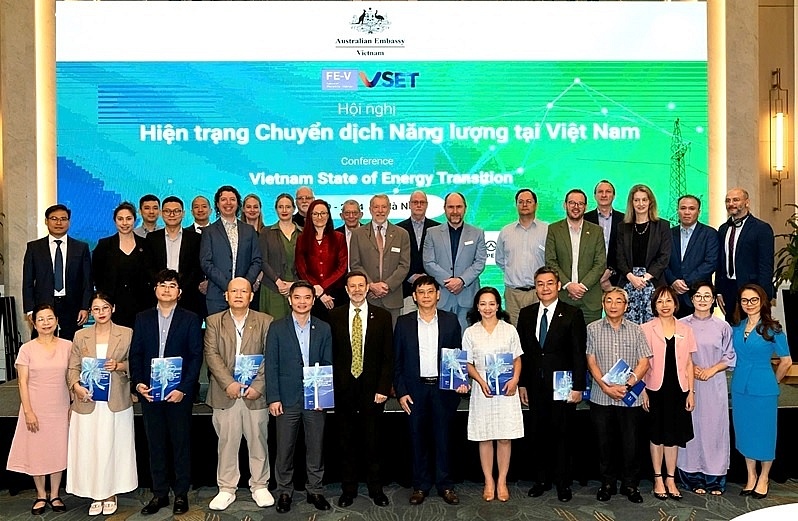 |
| Delegates from policy-makers, government agencies, business and energy institutions participating in the Conference. (Photo: The Embassy of Vietnam in Australia) |
Prof. Ken Baldwin, who is the director of the Energy Change Institute at the Australian National University, acknowledged that Australia is facing challenges related to human resources, supply chains, and financial mobilisation.
The country will need to invest billions of US dollars to upgrade and expand its electricity grid and replace lucrative fossil fuel export sectors such as coal and gas with clean alternative energies like green hydrogen. Furthermore, Australia must capitalise on export opportunities arising from decarbonisation, as demand for fossil fuels is expected to decline.
“Despite differences, both Vietnam and Australia are expected to see significant growth in electricity demand,” Baldwin stated. “Vietnam’s growth is driven by manufacturing and household needs, while Australia will require two to three times more electricity to replace fossil fuels.”
According to Baldwin, the growth in the electricity sector is driven by various business needs but necessitates substantial expansion in both countries. “Both countries will compete for capital, technology, and skilled labour, highlighting the need for collaboration to accelerate the energy transition and overcome challenges,” he added.
The close diplomatic relationship, which has lasted over 50 years, and the similarities in the potential for renewable energy development, as well as approaches to managing the energy transition, have prompted Australia to support Vietnam in this transformation.
Renewable energy currently accounted for nearly 40 per cent of Australia’s total electricity generation in 2023, while the figure for Vietnam is 26 per cent, according to data from the Ministry of Industry and Trade. The Australian government aims to increase the proportion of renewable energy to 82 per cent by 2030.
Similarly, Vietnam is developing gas power projects with the aim of promoting wind energy development, particularly offshore wind, which could gradually replace fossil fuel energy in the future.
Since 2022, the Future of Electricity in Vietnam programme, established by the Australian government, has brought together relevant agencies from both countries to share experiences and explore potential solutions for Vietnam’s electricity sector. The scheme has examined Vietnam’s electricity sector from seven key aspects: power sources, fuel, consumption, the electricity grid, markets, planning, and resilience. It draws on policy studies from Australia’s electricity sector and analyses the country’s experiences to provide useful references for Vietnam’s energy transition.
Mike Davidson, a specialist engineer from the Future Energy Systems at the Australian Energy Market Operator, emphasised that finance is a crucial element, alongside Australia’s commitment to supporting Vietnam’s energy transition through various funding mechanisms.
“Australia has provided $30 million over three years, with an additional $90 million committed to supporting Vietnam’s energy transition, along with a $2 billion financing package for economic growth and energy transition in Southeast Asia. These funds aim to mobilise private sector investment and provide blended finance,” he said. “I expect a lot of that to be sufficient.”
Collaboration between Australia and Vietnam is key to finding solutions for energy transition, according to Davidson. Australia has provided technical studies and reports to help Vietnam identify options for its energy transition, and continues its university partnerships to train the next generation of energy transition experts.
“Two main things Vietnam can do to improve its energy system are to explore new fuel sources, particularly low-carbon fuel sources, and to balance these fuel sources to meet customer demand and provide the utility that customers require,” said Davidson. “We’re looking forward to working with Vietnam on both of these challenges.”
The energy transition will not only help maintain stability in the national electricity system but also ensure long-term energy security for Vietnam.
Deputy Minister of Industry and Trade Nguyen Hoang Long stated that there are five issues Vietnam needs to address in its energy transition: capital sources, modern technology, skilled labour, governance capacity, and learning from experience, as well as suitable policies and legal frameworks to support the transition.
“Vietnam is also refining its legal framework to create a fair market for foreign and private Vietnamese investors to participate in the wind energy sector. We are reviewing the nation’s power plan and coordinating with international partners, including Australia, to finalise the plan in the near future,” Long said.
Vietnam is facing rapidly increasing demand for gas, according to assessments by the energy market research and consulting company Wood Mackenzie. It predicts that Vietnam’s gas demand will grow by an average of 12 per cent per year, reaching three times the current level by the mid-2030s.
This places significant pressure on the energy sector, particularly as domestic supply from current gas fields has sharply declined, with a reduction of 25 per cent over the past five years.
The electricity sector will continue to be the largest consumer of gas, with 14 per cent of projected supply expected to come from gas by 2030.
| Andrew Goledzinowski, Australian Ambassador to Vietnam
Australia and Vietnam are comprehensive strategic partners, where climate change and energy transition are among the key pillars. Firstly, there’s an AUD$30 million ($20.4 million) commitment by Australia, which we are using to mobilise private capital to assist with Vietnam’s energy transition, because it’s not something governments can achieve solely with their own funds. Secondly, we have another AUD$90 million ($61.1 million) commitment made by Prime Minister Albanese during his visit to Vietnam last year to support Vietnam in its energy transition. The third available fund is an AUD$2 billion ($1.36 billion) financing facility for energy transition in Vietnam and other Southeast Asian countries. These are the specific funds, but there are other sources of Australian government and multilateral funding that we can also utilise to help create blended finance for an effective transition for Vietnam. This is the second phase of our cooperation with Vietnam in terms of knowledge sharing. I have just handed over seven reports and discussion papers that provide a wealth of technical information gathered by experts in both Vietnam and Australia to explore options for transition. The first phase delivered five technical discussion papers. The next phase will commence now, marking the start of the third phase. We hope that the collaboration, which began in 2022, will continue and be beneficial for both countries. |
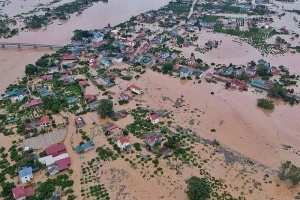 | Australia donates $2 million to Vietnam in wake of devastating typhoon The Australian government has donated AUD$3 million ($2 million) to Vietnam to help with humanitarian relief, emergency supplies, and other essential services in response to the devastation caused by Typhoon Yagi. |
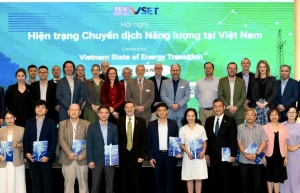 | Australia experts offer input on Vietnam’s green energy transition Australian and Vietnamese experts gathered in Hanoi on September 18 for the inaugural Vietnam State of Energy Transition (VSET) Conference. |
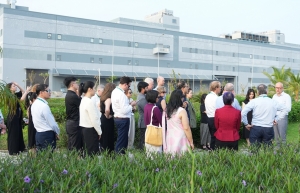 | Australia and Vietnam foster education and training towards green economy An Australian education delegation is in Vietnam to take part in the Australia Southeast Asia Business Exchange (A-SEABX) Mission from September 25-27 in Hanoi and Haiphong, focusing on the transition to net zero and advancing green economy priorities. |
What the stars mean:
★ Poor ★ ★ Promising ★★★ Good ★★★★ Very good ★★★★★ Exceptional
Related Contents
Latest News
More News
- Trung Nam-Sideros River consortium wins bid for LNG venture (January 30, 2026 | 11:16)
- Vietnam moves towards market-based fuel management with E10 rollout (January 30, 2026 | 11:10)
- Envision Energy, REE Group partner on 128MW wind projects (January 30, 2026 | 10:58)
- Vingroup consults on carbon credits for electric vehicle charging network (January 28, 2026 | 11:04)
- Bac Ai Pumped Storage Hydropower Plant to enter peak construction phase (January 27, 2026 | 08:00)
- ASEAN could scale up sustainable aviation fuel by 2050 (January 24, 2026 | 10:19)
- 64,000 hectares of sea allocated for offshore wind surveys (January 22, 2026 | 20:23)
- EVN secures financing for Quang Trach II LNG power plant (January 17, 2026 | 15:55)
- PC1 teams up with DENZAI on regional wind projects (January 16, 2026 | 21:18)
- Innovation and ESG practices drive green transition in the digital era (January 16, 2026 | 16:51)

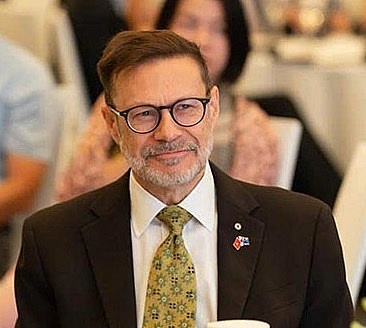
 Tag:
Tag:




















 Mobile Version
Mobile Version